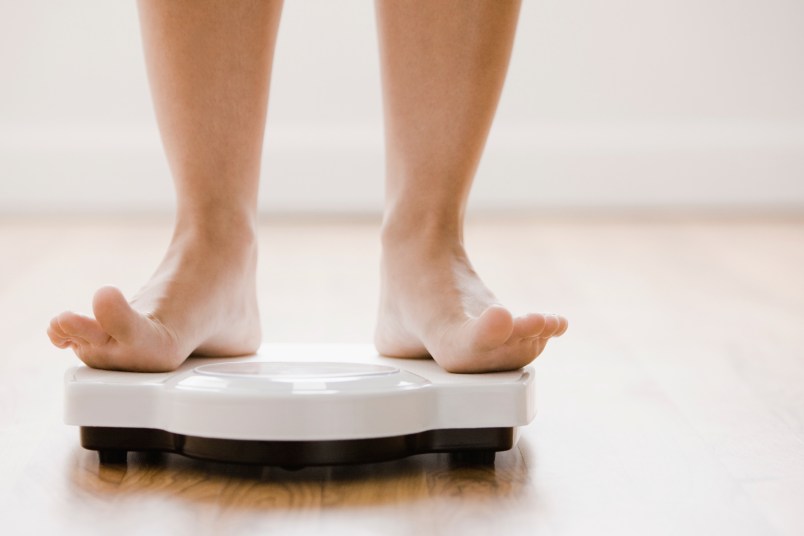Dieting for Dummies: 3 Weight-Loss Tips All Doctors Support

Trying to find good weight-loss advice can seem nearly impossible. One minute, researchers claim they’ve discovered a new superfood — and the next minute, a study comes out that asserts the exact opposite. As if losing weight wasn’t hard enough! But don’t despair — there are some pieces of solid advice that most, if not all, doctors tell their patients to follow when it comes to shedding pounds.
1. Don’t diet — make a lifestyle change.
When it comes to losing weight, the journey doesn’t stop the moment the scale reads your magic number. “Don’t diet; diets don’t work,” Susan L. Besser, MD, a primary care provider at Baltimore’s Mercy Personal Physicians at Overlea, told FirstforWomen.com. “They all work, but they don’t work. They work as long as you stay on them, but the minute you go off your diet and go back to the way your life was before, the weight comes back on — usually plus a few pounds. It’s a lifestyle. You have to come up with a lifestyle that you can live with that’s healthy.”
“A healthy lifestyle doesn’t mean starving yourself or giving up your favorite foods, because if you do that, sooner or later, you’re going to get angry, frustrated, hangry — and then you’re going to go off the deep end and eat everything in sight. Don’t do that. Make a plan that incorporates whatever your cravings are, whatever your must-haves are, but plan it, be aware of it, [and] be mindful of it,” says Dr. Besser. “Most of us don’t really know what we eat because we’re rushing around doing a million and one things, and we’re not really paying attention to what we’re eating. So you have to stop and figure out what your lifestyle is now in order to change it.”
Lifestyle changes don’t always have to be about food, either. Parking farther away from the office and walking or taking the stairs instead of the elevator are simple edits you can make in your daily routine that will positively affect your overall health.
2. Eat mindfully.
Perhaps you’ve heard of the term “mindful eating” recently and were intrigued. What is mindful eating? Is it when you (like us) start daydreaming about food? Actually, mindful eating is best understood if you first think about the concept of mindfulness. According to the National Institutes of Health, mindfulness is being totally present in your experiences, witnessing “life as it unfolds moment to moment, good and bad, and without judgment or preconceived notions.”
When mindfulness is applied to food, the process involves only chowing down when you’re hungry, stopping when you’re full, and savoring each bite. Mindful eating is the exact opposite of pounding down a bag of chips as you veg out in front of the TV.
As silly as it sounds, mindful eating seriously works when it comes to losing weight. A March 2018 review of weight loss and mindful eating studies found that all participants — all — lost weight while eating mindfully. In several of the studies, patients told researchers they were still losing weight after the study had finished.
“Increased mindful eating has been shown to help participants gain awareness of their bodies, be more in tune to hunger and satiety, recognize external cues to eat, gain self compassion, decrease food cravings, decrease problematic eating, and decrease reward-driven eating,” the researchers wrote.
Besser echoes these sentiments. “Eat mindfully,” she says. “Don’t eat while you’re running around town doing stuff, because then you don’t know you’ve eaten and you’re still going to be hungry because your mind isn’t paying attention. When you are eating, eat, just eat! Don’t play video games, don’t watch TV, don’t chat with your friends, don’t text, don’t drive, don’t shop — eat. You will eat less, get full more quickly, and you’ll feel satisfied because you’re aware of what you’re eating. Eat with awareness. Don’t just, as the kids would say, scarf it down. Eat with awareness. Be aware of the taste, the texture, the color, the smell — all of that helps.”
3. Avoid processed foods.
“The one common denominator between every single diet that has been successful — some say have fiber, some say have protein, some say avoid carbs, some say avoid fats — the one common denominator between all of these diets when they’re successful is there are no processed foods,” Nancy P. Rahnama MD, told FirstforWomen.com. “There isn’t one diet that fits all. Everybody is on some different type of a plan. The variables that would determine what [plan] is right for them is their lifestyle, their genetics, the things that are important to them, the things they know they can’t live without. And it’s all about finding out what works for them. So if it works for them, then it’s good — but no one should recommend processed foods.”
OK, OK, so we all probably knew that processed foods were a no-no. So how can you cut them out of your diet? Start slowly. Think of this step as part of the “lifestyle change” Besser described. Reducing your intake of processed foods becomes easier when you don’t have them around the house. Nixing them from your shopping cart, bringing fresh fruit to work instead of a bag of chips, and replacing sugary soda with water are simple ways to start small.
More From FIRST
Why Do My Nails Have Dents in Them?
Inexpensive Tuberculosis Vaccine Could Reverse Type 1 Diabetes, Study Suggests
Fish Oil Supplements Could Be Key in Slowing the Onset of Alzheimer’s Disease, Study Suggests













